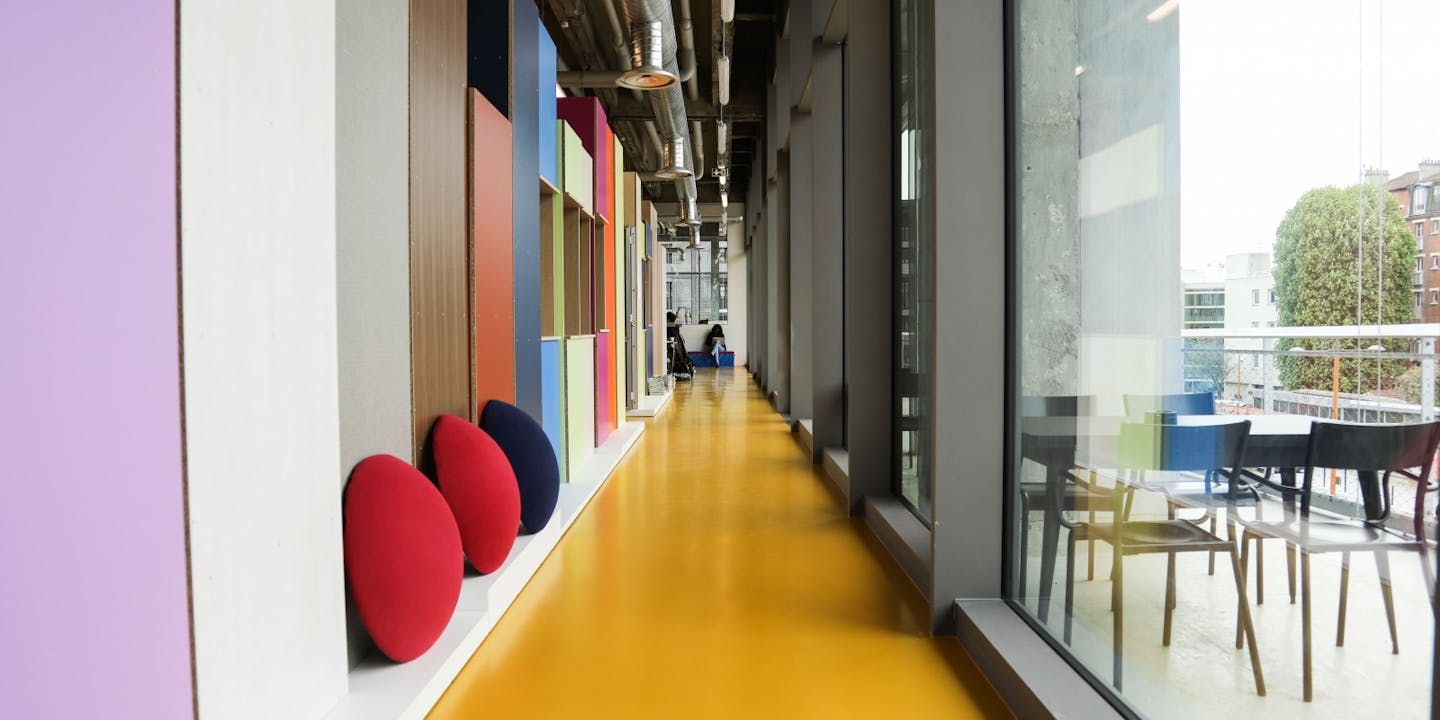TODAY’S WORKPLACE ISN’T JUST A DECORUM
“The top 6 office indoor slides”. No, this isn’t an article written by the French satire site Gorafi (equivalent to American “The onion”), but the title of a serious news story on companies that offer great work environments. The days of individual corner offices at the top of skyscrapers are behind us. Today’s employees, both young college recruits and old-timers, dream of working from their living room or in Disneyland-style workplaces where deep couches, pinball machines and football tables adorn meeting rooms specifically designed to foster creativity and innovation – two catchwords of the new economy. Does this sound a bit “out there”? Not to us who work for the BETC communications agency, which recently took over the Magasins Généraux site and turned it into a playground for young designers, testing in the process the concept of the “open office”. But we’ll get back to that later…
What’s interesting to us is understanding how this new approach to office workflow and design reflects the new relationship people have with work, and what opportunities and challenges it presents to the companies that embrace it. We don’t believe this is just a passing trend or a form of corporate self-indulgence. Office layouts have always reflected the state and mindset of society. Like the advent of the first open-spaces in the United States, which extended Fordist principles to the organization of the service industry, which was booming at the time. So what do we expect from our places of work today? What do they say about our current society and our attitude towards work ?
IS WORKSPACE COMPENSATING NOW FOR SATISFACTION AND MEANING THAT JOBS NO LONGER GUARANTEES ?
A number of recurring themes have appeared in the media these past few years. After the “burnout” epidemic, here comes the outbreak of “brown-outs”, more colloquially known as the “Bullshit Jobs”. These new work-related syndromes (and terms) reflect the growing unease felt by staff (mostly mid-level employees and managers) about their jobs. Jobs that have seemingly lost all meaning. This is reflected by the growing ranks of young graduates who dream of creating their own company (25% of HEC graduates made that choice in 2015, compared to only 15% ten years ago), but also in the rising number of those who choose to give up corporate life to pursue various forms of manual work. To counter this disconnection and general malaise, companies are stepping up their efforts to bring more flexibility, responsibility and innovation to the workplace. They’re also highlighting their broader social commitments – notably by giving staff the opportunity to take part in skills-based sponsorship programs, or by paying for their solidarity leaves. Finally, they’re investing massively in their office spaces. Of course, many relocations and refurbishments are motivated by economic reasons. But they’re also driven by the desire to answer the “search for meaning” felt by their employees. When one speaks to young entrepreneurs, they inevitably bring up their quest for a modern co-working environment, with thick carpets, comfy sofas and a communal kitchen. And when one speaks to young graduates who want to break away from corporate life, they talk about their dreams of opening organic grocery stores and restaurants, or concept-stores infused with a feeling of “luxury, calm and voluptuousness”. In other words, human-sized places decorated with wood, concrete, glass and greenery. So one might think that the esthetics of the workplace have now become more important than the work itself. That working in a beautiful office has become the sine qua non condition for achieving happiness and fulfillment. And finally, that places of work have become elegant Persian carpets under which one’s deeper issues can be swept, like actually needing to work and having to get up in the morning…
WE BELIEVE THAT CREATING NEW WORKSPACES - DESIGNING, OUTFITTING AND DECORATING THEM – ISN’T JUST A COSMETIC ENDEVOR BUT AN OPPORTUNITY TO REDEFINE THE CORE VISION OF A CATEGORY, PROFESSION, OR COMPANY.
That’s what we aimed to do here at BETC. It wasn’t about creating a cool place for sneaker-wearing thirty-something hipsters to lounge around in all day drinking lattes. It was about inventing a new way of working, using spaces that encourage human interaction and communication. To further mingle people’s experience and talent and allow meaningful and creative ideas to flourish. To meet the challenge of cross-functional integration for our clients and meet the challenge of efficient communication for people.
